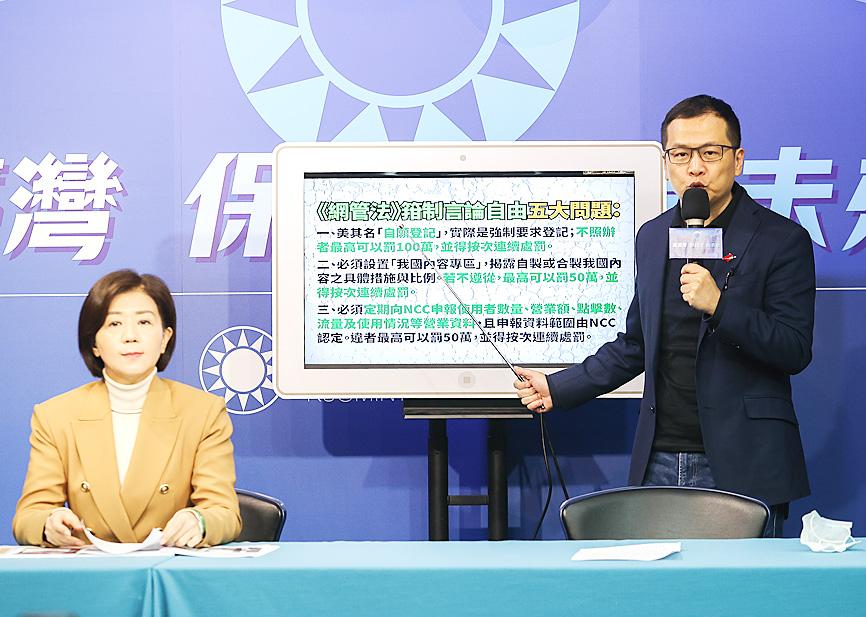The Chinese Nationalist Party (KMT) yesterday accused the government of attempting to control free speech on the Internet with its plans for an over-the-top media services management act.
While the National Communications Commission’s (NCC) draft version of the act would allow over-the-top media service providers to register on what the NCC has described as a “voluntary” basis, under the same act, the agency could also require mandatory registration of providers based on measures such as their number of users, revenue, amount of traffic or market influence, or for some other major public interest, the KMT said.
The draft act proposes a fine of up to NT$1 million (US$35,149) for those who do not register as requested, with the possibility of further fines, the party said.

Photo: CNA
Article 13 of the draft act states that if the NCC determines that a provider’s content is “harming national security,” or “harming public order or good morals,” the provider could be fined up to NT$1 million if corrections are not made within a specified time frame, with the possibility of further fines, the KMT added.
The proposed act would allow the government to “suppress people’s comments on the Internet,” KMT Institute of Revolutionary Practice director and Taipei City Councilor Lo Chih-chiang (羅智強) said at a news conference in Taipei.
The KMT said that if the act proposed by the NCC is implemented, “in the future, there will be no freedom of speech in Taiwan.”
KMT Culture and Communications Committee director-general Alicia Wang (王育敏) said the government should not “test the public’s limits,” as there continues to be some anger about the removal on Saturday of CTi News after the NCC rejected the channel’s application to renew its broadcasting license.
“The anger has turned into support,” she said, citing an increase in subscribers to CTi News’ YouTube channel to more than 2 million.
Instead of reflecting on the public outcry over CTi News, the government is doubling down to “further suppress opinions on the Internet,” she added.
The KMT said that it would try to block the proposed act and it urged people to “come together and help defend the basic value of freedom of speech.”
The NCC also plans to propose a digital communications act which would “expand the scope of the suppression of freedom of speech,” the KMT said.
Accusing the government of wanting to “exclude all dissident voices on the Internet,” the party said that the two proposed acts would be the equivalent of a “digital” version of the authoritarian-era Publication Act (出版法), which suppressed ideas and restricted creative freedom.
Separately yesterday, NCC Chairman Chen Yaw-shyang (陳耀祥) said that the proposed digital communications act would better regulate “inappropriate” content on online platforms and that it would not be used to censor the Internet.
The government would never engage in censorship of the Internet, as it is a free, open and innovative space, Chen said.
The NCC is still drafting the bill and would listen to the views of all parties before presenting its final version to the legislature, he said.
The NCC proposed a similar act in 2018, but the bill was not passed by lawmakers due to concerns over censorship of the Internet.
That bill covered major online social media such as Facebook, YouTube and Instagram, and would have allowed people to report misinformation and fabricated news on an online platform.
Additional reporting by CNA

The brilliant blue waters, thick foliage and bucolic atmosphere on this seemingly idyllic archipelago deep in the Pacific Ocean belie the key role it now plays in a titanic geopolitical struggle. Palau is again on the front line as China, and the US and its allies prepare their forces in an intensifying contest for control over the Asia-Pacific region. The democratic nation of just 17,000 people hosts US-controlled airstrips and soon-to-be-completed radar installations that the US military describes as “critical” to monitoring vast swathes of water and airspace. It is also a key piece of the second island chain, a string of

A magnitude 5.9 earthquake that struck about 33km off the coast of Hualien City was the "main shock" in a series of quakes in the area, with aftershocks expected over the next three days, the Central Weather Administration (CWA) said yesterday. Prior to the magnitude 5.9 quake shaking most of Taiwan at 6:53pm yesterday, six other earthquakes stronger than a magnitude of 4, starting with a magnitude 5.5 quake at 6:09pm, occurred in the area. CWA Seismological Center Director Wu Chien-fu (吳健富) confirmed that the quakes were all part of the same series and that the magnitude 5.5 temblor was

The Central Weather Administration has issued a heat alert for southeastern Taiwan, warning of temperatures as high as 36°C today, while alerting some coastal areas of strong winds later in the day. Kaohsiung’s Neimen District (內門) and Pingtung County’s Neipu Township (內埔) are under an orange heat alert, which warns of temperatures as high as 36°C for three consecutive days, the CWA said, citing southwest winds. The heat would also extend to Tainan’s Nansi (楠西) and Yujing (玉井) districts, as well as Pingtung’s Gaoshu (高樹), Yanpu (鹽埔) and Majia (瑪家) townships, it said, forecasting highs of up to 36°C in those areas

IN FULL SWING: Recall drives against lawmakers in Hualien, Taoyuan and Hsinchu have reached the second-stage threshold, the campaigners said Campaigners in a recall petition against Chinese Nationalist Party (KMT) Legislator Yen Kuan-heng (顏寬恒) in Taichung yesterday said their signature target is within sight, and that they need a big push to collect about 500 more signatures from locals to reach the second-stage threshold. Recall campaigns against KMT lawmakers Johnny Chiang (江啟臣), Yang Chiung-ying (楊瓊瓔) and Lo Ting-wei (羅廷瑋) are also close to the 10 percent threshold, and campaigners are mounting a final push this week. They need about 800 signatures against Chiang and about 2,000 against Yang. Campaigners seeking to recall Lo said they had reached the threshold figure over the